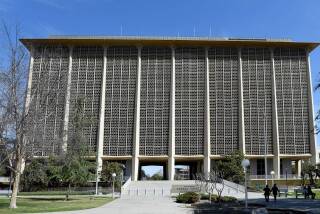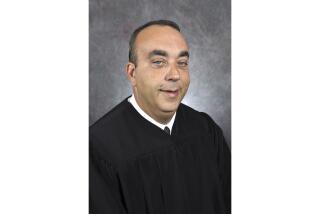Judge Kills Himself After Child Sex Abuse Inquiries
A longtime Los Angeles County judge fatally shot himself at a Valencia park Thursday after detectives contacted him about an allegation that he had molested a child, authorities said.
Lloyd Jeffrey Wiatt, a 61-year-old former prosecutor who presided over several high-profile trials, was the subject of a preliminary investigation, said Lt. Dan Rosenberg of the Los Angeles County Sheriff’s Department.
Rosenberg declined to discuss the case other than to say that someone had accused the judge of child sexual abuse. He stressed that the detectives were just beginning to examine the accusation and had not determined whether Wiatt should be arrested.
Deputies contacted Wiatt on Wednesday at his home in Valencia, and during the conversation, the judge became distraught, Rosenberg said. Worried that he was suicidal, detectives began monitoring his movements using a commercial anti-theft tracking device that Wiatt had on his car.
As they followed him into Towsley Canyon Park on Thursday afternoon, detectives talked to Wiatt on a cellphone and urged him not to hurt himself, Rosenberg said.
“The investigators at the scene were more concerned for his safety and his welfare than to make an arrest,” he said.
At some point, Wiatt pulled out a gun and shot himself in the head before detectives could get to him.
Judges and lawyers across Los Angeles on Friday expressed shock at Wiatt’s death.
“He was a cherished colleague, and he will be deeply missed,” said Los Angeles County Superior Court Judge Alice Hill, who supervises the Chatsworth Courthouse, where Wiatt worked for the last three years overseeing civil cases.
Before moving to the Chatsworth court, Wiatt presided over major criminal trials at the San Fernando courthouse.
“I’ve known Judge Wiatt for a number of years and have tried cases before him,” said Deputy Dist. Atty. Craig Richman, the assistant head deputy of the San Fernando courthouse. “I respected him and admired him and considered him a friend. I’m deeply saddened by his death.”
Some attorneys said Wiatt was known for his blunt manner in the courtroom, where they said he was quick to take both prosecutors and defense attorneys to task.
In 1999, during the trial of Sylmar widow Jeanie Adair -- who was accused of bludgeoning her husband, Robert, to death with a baseball bat for insurance money -- Wiatt’s outspoken manner was on display, said Marsh Goldstein, the prosecutor in the case.
At one point, he barred the victim’s mother from the courtroom -- and ordered her to stay 500 yards away from the courthouse -- after Adair complained that the mother whispered, “You’re going to burn” to her when they ran into each other in a restroom.
“Appearing before him in the courtroom was the worst experience in my professional life,” said Goldstein, who has since retired.
After a jury acquitted Adair, Wiatt declared her “factually innocent,” an unusual ruling that would have erased records of her arrest and criminal trial. But state appellate judges reversed the ruling in 2001, finding that Wiatt abused his discretion.
A graduate of USC, Wiatt attended Whittier Law School and joined the district attorney’s office in 1975. He left in 1978 to work in private practice. He served as a part-time Juvenile Court referee before Gov. Pete Wilson appointed him to the Los Angeles Municipal Court in 1993. In 1995, Wilson elevated him to the Superior Court.
Wiatt oversaw several high-profile cases, including the death penalty trials of Sandi Nieves, a woman convicted of setting a fire to kill her four daughters, and Kenneth Gay, who was found guilty of fatally shooting a police officer.
Wiatt lived in a cul-de-sac in an upscale section of Valencia.
A woman at his home declined to comment and asked that the family’s privacy be respected.
Wiatt is survived by a wife and two children.
*
Times staff writers Jean Guccione, Amanda Covarrubias and Richard Winton contributed to this report.
More to Read
Sign up for Essential California
The most important California stories and recommendations in your inbox every morning.
You may occasionally receive promotional content from the Los Angeles Times.










